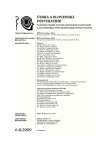-
Medical journals
- Career
Dissocial Disorder of Personality under Condition of Duration of Sentence Analyzing the Efficiency of Correction Remedies Applied against Antisocial Behavior in Penitentiary Practice
Authors: I. Žukov; S. Fischer; R. Ptáček
Authors‘ workplace: Psychiatrická klinika 1. LF UK a VFN, Praha přednosta prof. MUDr. J. Raboch, DrSc.
Published in: Čes. a slov. Psychiat., 105, 2009, No. 6-8, pp. 250-256.
Category: Original Article
Overview
The article presents results of survey focused to analysis of behavioral methods used in prison practice in persons with antisocial behavior and dissocial personality disorder. Effects of reward and punishment as subservience of behavior modification of prisons were analyzed. Changes were compared between groups of prisons dividend according to factors considered as important in delinquency development. The findings can be used in forensic psychological, psychiatric and ethopedic practice. For forensic experts the findings can be used for evaluation of resocialization of persons with antisocial behavior and dissocial personality disorder. In our study we showed that means of effective and positive influence of behavior in the studied group are practically missing.
Key words:
dissocial personality disorder, antisocial behavior, efficiency of reward and punishment, execution of a punishment by imprisonment, penal process, prisonization, criminality, resocialization.
Sources
1. Andrews, D. A. , Bonta, J.: The psychology of criminal conduct. Cincinnati, Anderson Press., 1994.
2. Cloninger, C. R.: Personality and psychopathology. American Psychiatric Publishing Inc., 1999.
3. Fischer, S.: Etopedie v penitenciární praxi. Ústí nad Labem, Acta Universitatis Purkynianae, 2006.
4. Fischer, S., Škoda, J.: Sociální patologie. Analýza příčin a možnosti ovlivňování závažných sociálně patologických jevů. Praha, Grada Publishing, 2009.
5. Glasser, W., Deane, K.: Normalization in an abnormal world: A study of prisoners with an intellectual disability. International Journal of Offender Therapy and Comparative Criminology, 43, 1999, 3, pp. 338-356.
6. Inciardi, J. K.: Trestní spravedlnost. Praha, Victoria Publishing, 1994.
7. Matoušek, O., Kroftová, A.: Mládež a delikvence. Praha, Portál, 2003.
8. Mezinárodní klasifikace nemocí. 10. revise, Praha, MZV ČR, 1992.
9. Nakonečný, M.: Motivace lidského chování. Praha, Academia, 1979.
10. Pavlovský, P.: Soudní psychiatrie a psychologie. Grada Publishing, 2004.
11. Perry, J. C., Bond, M.: Empirical studies sof psychotherapy for personality disorder. In: Gunderson J. G., Gabbard, G. O.( eds.): Psychotherapy for personality disorders. Review of Psychiatry, 19, 2000, pp. 1-32.
12. Smith, A. B., Berlin, L.: Treating the criminal offender. Heidelberg, Springer, 1988.
13. Študent, V.: Soudní psychiatrie a trestní právo. SPN, Praha, 1989.
14. Thomas, Ch. W., Foster, S. C.: Prisonization in the inmate contraculture. Social Problems, 20, 1972, pp. 229-239.
15. Vágnerová, M.: Psychopatologie pro pomáhající profese. Praha, Portál, 2004.
16. Weiner, I. B., Hess, A. K.: The handbook of forensic psychology. John Wiley & Sons, Inc., 2005.
17. Žukov, I., Vevera, J.: Vyšetřovací metody u kriminálního chování. Neurobiologie duševních poruch, Praha, Galén, 1999.
18. Žukov, I., Fischer, S., Ptáček, R.: Duševní a behaviorální poruchy v důsledku vazebního uvěznění u poruch osobnosti a osob závislých na psychoaktivních látkách (Kazuistiky z forenzní psychiatrické a psychologické praxe). Alkoholismus a drogové závislosti, 44, 2009, 1, s. 23-38.
Labels
Addictology Paediatric psychiatry Psychiatry
Article was published inCzech and Slovak Psychiatry

2009 Issue 6-8-
All articles in this issue
- HoNOS (Health of the Nations Outcome Scales) – an Adaptation of the Tool for the Assessment of Symptoms and Social Functions in Serious Mentally Ill in the Czech Conditions and Its Use
- Psychosomatic Transformation of Peripheral Somatic Disorder (Benign Paroxysmal Position Verig)
- Dissocial Disorder of Personality under Condition of Duration of Sentence Analyzing the Efficiency of Correction Remedies Applied against Antisocial Behavior in Penitentiary Practice
- Neuromechanisms of Addictive Substances, Reward System
- EEG Gamma Oscillations in Schizophrenia
- Membranes V - Epilogue of the Cycle
- Addictive Behavior on the Internet and Its Treatment
- Schizophrenia in Mentally Retarded Patients, Diagnostic Consideration and Practical Experience
- Czech and Slovak Psychiatry
- Journal archive
- Current issue
- Online only
- About the journal
Most read in this issue- Neuromechanisms of Addictive Substances, Reward System
- Schizophrenia in Mentally Retarded Patients, Diagnostic Consideration and Practical Experience
- Psychosomatic Transformation of Peripheral Somatic Disorder (Benign Paroxysmal Position Verig)
- Addictive Behavior on the Internet and Its Treatment
Login#ADS_BOTTOM_SCRIPTS#Forgotten passwordEnter the email address that you registered with. We will send you instructions on how to set a new password.
- Career

